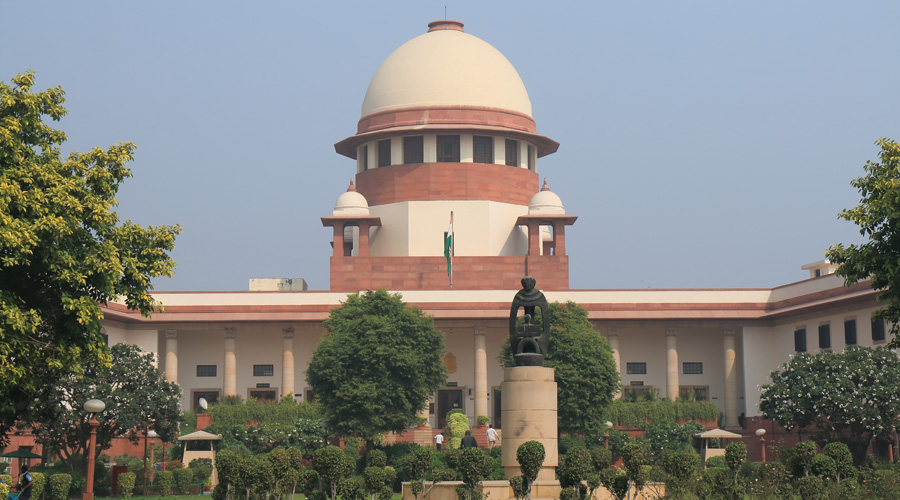The Supreme Court on Tuesday orally observed that Talaq-e-Hasan, a form of divorce in Islam, was prima facie “not so improper” as instant triple talaq which it struck down in 2017.
The court — hearing an appeal by Benazeer Heena, a journalist from Uttar Pradesh’s Ghaziabad, seeking that Talaq-e-Hasan be declared “unconstitutional” — said it did not want the petition to become “an agenda for any other reason”.
The banning of instant triple talaq had become a political issue.
Under Talaq-e-Hasan, a Muslim man can divorce his spouse by pronouncing the word “talaq” thrice spread over a period of three months. But if during these three months the husband and wife cohabit, it amounts to reconciliation.
In instant triple talaq, the word “talaq” used to be pronounced thrice at one go.
“This (Talaq-e-Hasan) is not triple talaq in that sense. Marriage is a form of contract. Prima facie this is not so improper. You (Heena) also have the option of Khula. If two people cannot live together, we are also granting divorce by mutual consent (for Hindus, Christians and people of various other religions) due to irretrievable breakdown of marriage. Are you open to divorce by mutual consent if Meher is taken care of…
subject to appropriate Meher?” Justice Sanjay Kishan Kaul, heading a two-judge bench, asked senior advocate Pinky Anand, representing Heena.
“…Even without the intervention of the court, Mubarat is permissible by consent,” the bench noted.
Mubarat is a form of divorce by mutual consent among Muslim couples without court intervention. Khula is a procedure through which a Muslim woman can divorce her husband. Meher is a gift or contribution made by the husband-to-be to his wife-to-be.
Justice Kaul, sitting with Justice M.M. Sundresh, said: “Prima facie, I don’t agree with the petitioner. Let us see. I don’t want this petition to become an agenda for any other reason.” The court posted the matter for further hearing to August 29.
Heena, the petitioner, has assailed Talaq-e-Hasan on the ground that it is unilateral and arbitrary. Senior advocate Anand has pleaded that although a five-judge constitution bench of the Supreme Court had in 2017 declared instant triple talaq as unconstitutional, it had not made any pronouncements on other forms of divorce like Talak-e-Hasan.
The court passed the following written order on Tuesday: “…Learned senior counsel for the petitioner seeks some time to obtain instructions in view of the proceedings in WP (writ petition)… which are stated to have been filed by the petitioner in the Delhi High Court and the nature of proceedings.
“We have also put to learned senior counsel whether in view of the allegation of respondent of irretrievable breakdown of marriage, would the petitioner be willing for a settlement by process of divorce by mutual consent on amounts being paid over and above the Meher fixed. In fact, we have brought to their notice that dissolution of marriage is also possible without the intervention of the Court through Mubarat. Learned counsel seeks some time to obtain instructions. List on 29.08.2022.”
Heena has contended that “many Islamic nations have restricted such practice (Talaq-e-Hasan), while it continues to vex the Indian society in general and Muslim women like the petitioner in particular”.
“It is submitted that the practice also wreaks havoc on the lives of many women and their children, especially those belonging to the weaker economic sections of the society. Muslim women can’t give Talaq-e-Hasan and other forms of unilateral extra-judicial talaq but Muslim men can. Such discrimination and inequality hoarsely expressed in form of polygamy is abominable when seen in light of the progressive times of the 21st century.”
Heena submitted that Talaq-e-Hasan and other forms of unilateral divorce are a plague similar to sati, and religious heads like imams and maulvis “who propagate, support and authorise… (these) are grossly misusing their position, influence and power to subject Muslim women to such gross practice which treats them as chattel, thereby violating their fundamental rights enshrined in Articles 14 (right to equality), 15 (non-discrimination), 21 (life and personal liberty), 25 (religious freedom).”
She has sought a direction to the Centre to frame guidelines for “gender-neutral, religion-neutral uniform grounds of divorce and a uniform procedure of divorce for all citizens”.
Heena told the court that she married Yusuf Naqi, a resident of Delhi, on December 25, 2020, and the couple have a child. She alleged that she was constantly harassed and tortured by her husband for more dowry and when her father refused to give in, Naqi decided to divorce her through Talaq-e-Hasan.











